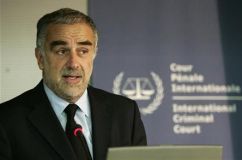ICC Prosecutor says 1st case against Sudan crimes is ready
Dec 15, 2006 (UNITED NATIONS) — The chief prosecutor for the International Criminal Court said he believes his investigation has collected enough evidence to prove who are those most responsible for war crimes and crimes against humanity in Sudan’s Darfur region.

“We are ready to present the first case to the judges,” he told reporters afterwards. “The case will show evidence of willful killings, massive rapes, tortures and pillaging of entire villages.”
Ocampo refused to divulge the number of people in the case or the names, but he said the investigation focused on “a series of incidents that occurred in 2003 and 2004, during a period and in a location where the highest number of crimes were recorded.”
“We believe we have enough evidence to prove who are the most responsible for the crimes committed in Darfur,” he said.
Richard Dicker, head of the international justice program at Human Rights Watch, welcomed Ocampo’s plans to move on the case.
“Pressing criminal charges against those responsible for serious crimes in Darfur is urgently needed. It will signal an end to the impunity that has marked the horrors of Darfur for three years,” Dicker said.
More than 200,000 people have been killed and about 2.5 million people displaced in three years of fighting in Darfur between African rebels and government troops allied with Arab militia known as janjaweed. The conflict has spread into neighboring Chad and the Central African Republic and is now in “free fall,” with the prospect of 6 million people in a hopeless situation without food or protection, outgoing U.N. humanitarian chief Jan Egeland said last week.
Ocampo said that since the Central African Republic is a party to the court and Chad will become a party on Jan. 1, his office is also gathering information on crimes in both countries.
The court is the world’s first permanent war crimes tribunal and acts as a court of last resort. Under the Rome statute, the prosecutor must first assess whether the government – in this case Sudan – is building the same case.
Ocampo said he had asked the Sudanese for an update on their national proceedings and had received a reply that 14 people have been arrested for violations of international humanitarian law and human rights abuses.
But he said the Sudanese government isn’t preparing cases against the same people the ICC is investigating so he plans to proceed and put his case before the court’s judges in February.
“The only way to stop me from putting my case before the judges is if there is a case in the national system,” Ocampo said. “If there is a case in the national system, then I will request to go to see the case…”
Ocampo said he has asked the Sudanese to facilitate a visit by his team in January to gather information on the 14 arrests and to follow up on some previous requests.
In August, he said, court officials interviewed two high-ranking officials “but there are some outstanding requests still pending and I hope we’ll be able to do it in January.”
“We are talking to the Sudanese ambassador and probably we will be invited to go to Khartoum,” he told reporters.
Ocampo said the government of Sudan reaffirmed its commitment to cooperate with the court in its reply about the 14 arrests.
Sudan’s U.N. Ambassador Abdalmahmood Abdalhaleem reiterated his country’s complaint that referring the Darfur issue to the ICC was a “very much politically motivated decision.”
He said the government has issued indictments and “we think that it is within the competence of our system that we will prosecute whoever is committing crimes in Darfur.”
As to whether Sudan would hand over anyone indicted by the ICC, Abdalhaleem said: “Our courts are capable of doing whatever preserves justice in the country.”
(AP)
